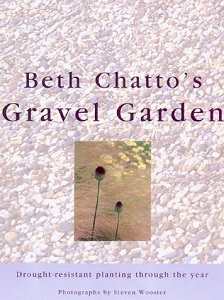 One of my favorite books in the Miller Library collection is Beth Chatto’s Gravel Garden. Published in 2000, it recounts the development of a formerly grassy parking area into a garden with gravel used as mulch, and no irrigation once plantings were established.
One of my favorite books in the Miller Library collection is Beth Chatto’s Gravel Garden. Published in 2000, it recounts the development of a formerly grassy parking area into a garden with gravel used as mulch, and no irrigation once plantings were established.I visited the Chatto garden in August 2000 when the garden was in its eighth season. I was charmed with the concept and especially the look of the garden. When I learned a book was coming out, it was a must not only for the Miller collection, but also for my home library.
Beth Chatto (1923-2018) was an early proponent of the concept of “right plant, right place,” choosing plants with needs that match the conditions of their garden setting. Gravel Garden is a careful study of what plants have worked in this new garden, and those that have not.
Your mental image of England may be of green meadows and lush gardens nurtured by gentle summer rains. However, this garden is in Essex, one of the driest counties, and averages only 20” inches of rain per year. By contrast, Seattle has nearly twice that amount. One key difference is the rainfall is distributed evenly through the months, so that the long, droughty summers we experience are not typical there.
Sadly, this may be changing. In June 2023, I attended the Hardy Plant Study Weekend at the University of British Columbia in Vancouver. John Grimshaw, noted author and director of the Yorkshire Arboretum, reported that precipitation throughout the eastern part of England has been diminishing, and summers are drying out.
Last summer was especially bad and the Beth Chatto Garden blog reported that as of mid-August 2022, it had been two months without any rain. A similar drought occurred in 1995. In the book, Chatto describes at the end of that summer “a dry look to this area, but not a dead look.” She continues, “I am often thankful to see how many plants not only survive but look good after this testing period of drought.” A list of the successes, and the few failures, follows. I consult it frequently.
Reviewed by Brian Thompson.